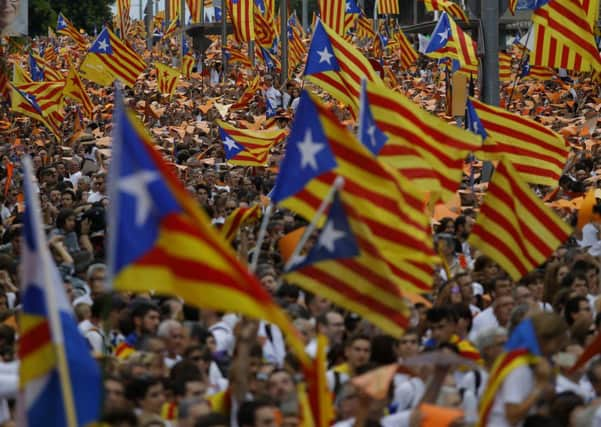What lessons can Nicola Sturgeon learn from Catalonian Indyref plans?


Readers in Scotland, especially those weary of talk over another plebiscite, will have a feeling of solidarity with those in the area that includes Barcelona, as this is the second time in three years the Spanish region will have its say on constitutional matters.
The poll, tentatively scheduled for October 1, comes just over three years since a technically illegal vote on the same subject was approved by 80 per cent of the population, though on a turnout estimated to be around 40 per cent.
Advertisement
Hide AdAdvertisement
Hide AdConsequences were swift, and resulted not only in the results of the referendum being ignored by the Spanish state, but in former Catalonia President Artur Mas being convicted of violating the constitution.
Scotland, of course, isn’t Catalonia, despite the many years of friendship and co-operation between their respective independence movements.
That doesn’t mean, however, there aren’t lessons that Nicola Sturgeon can learn as she pushes her plans for Indyref2 down the road, but not completely off the table.
Co-operation over agitation?
The one thing that stands out, in terms of a difference between the Scottish and Catalan independence referendums in 2014, is the lack of Government involvement.
The latter of the two was given varying titles, to avoid the legal ramifications of claiming that the result was nothing more than an advisory outcome.
Artur Mas was seemingly convinced, as previous regional leaders have been, that the overwhelming support for independence in a referendum would convince the Government in Madrid to change their hard-line stance.
He failed spectacularly. Not only on a personal level, as he was banned from holding public office, but on a political level as the low turnout was portrayed by opponents of Catalan independence as a damp squib.
That ‘non-binding citizen participation process’ as the legalese had it, was held entirely without the consent of the Government at a national level.
Advertisement
Hide AdAdvertisement
Hide AdNicola Sturgeon hasn’t yet committed to holding a non-binding referendum after her request to Theresa May for a transfer of the powers to hold Indyref2 was refused.
However, it does seem to be one of few options remaining to her should what the SNP call the ‘democratic outrage’ of that refusal continue.
No-one is expected Ms Sturgeon to be clapped in irons should the Scottish Government hold an advisory referendum, but the (political) fate of Senor Mas is its own cautionary tale.
March to success?
One of the things that inspired the movement to legislate for an advisory referendum in Catalonia was a series of popular marches through Barcelona.
A particular protest in 2012, which attracted anything from 500,000 to a million people (estimates widely vary) was seen as a defining moment in the quest for separation from Spain.
That didn’t quite translate to the ballot box when the day arrived for the referendum in 2014, with less than half a million voters in Barcelona’s voting district backing independence.
READ MORE: Alex Orr: Nationalists ready for Indyref2.. no, not that one
Protests in Scotland haven’t been anywhere near the scale of those in Catalonia (it has a smaller population for one) but there is still a warning in there about enthusiasm among diehards not being reflected in the general populace.
Advertisement
Hide AdAdvertisement
Hide AdSome even took the modestly attended march and rally earlier this year in Glasgow as a sign that the Unionist claim there was little appetite for a second independence referendum was false.
It is not (yet) mainstream SNP opinion, but the relative apathy of the Catalan voters, despite wide scale protests, is another warning sign.
International angle
Another thing that was a feature of both referendums, is that the lack of international allies can still have an impact.
The intervention of Barack Obama on the losing side in the EU referendum might be taken as a sign that the potency of global contributions to domestic votes has diminished.
It is possible that the rescheduled referendum will see less interventions from abroad, but as with Scotland’s vote, membership of supra-national bodies like NATO can become key issues.
The UK and Spanish Governments might clash over the status of Gibraltar, but when it comes to aspiring nations within their respective state’s borders, they speak as one.
Knowing the success of one nationalist movement can inspire the other, leaders of either country can usually be relied upon to advocate retaining the status quo in the other.
Ms Sturgeon has made a number of foreign visits, but still seemingly lacks an international ally in her plans to hold another vote before the end of this parliamentary term.
Advertisement
Hide AdAdvertisement
Hide AdOne edge that the Catalan Government has is that, while polls on the actual outcome vary, there is consistent support for holding it.
That is why the current Government has waited until now to have a re-run of their vote, with support as high as 70 per cent in some surveys.
With desire for Indyref2 nowhere near that in Scotland, perhaps the biggest lesson Nicola Sturgeon can learn is not to overplay her hand before having the public’s backing.
